Unit 10 If you go to the party, you'll have a great time! Section A 重要知识考点+练习过关 (含答案)
文档属性
| 名称 | Unit 10 If you go to the party, you'll have a great time! Section A 重要知识考点+练习过关 (含答案) | 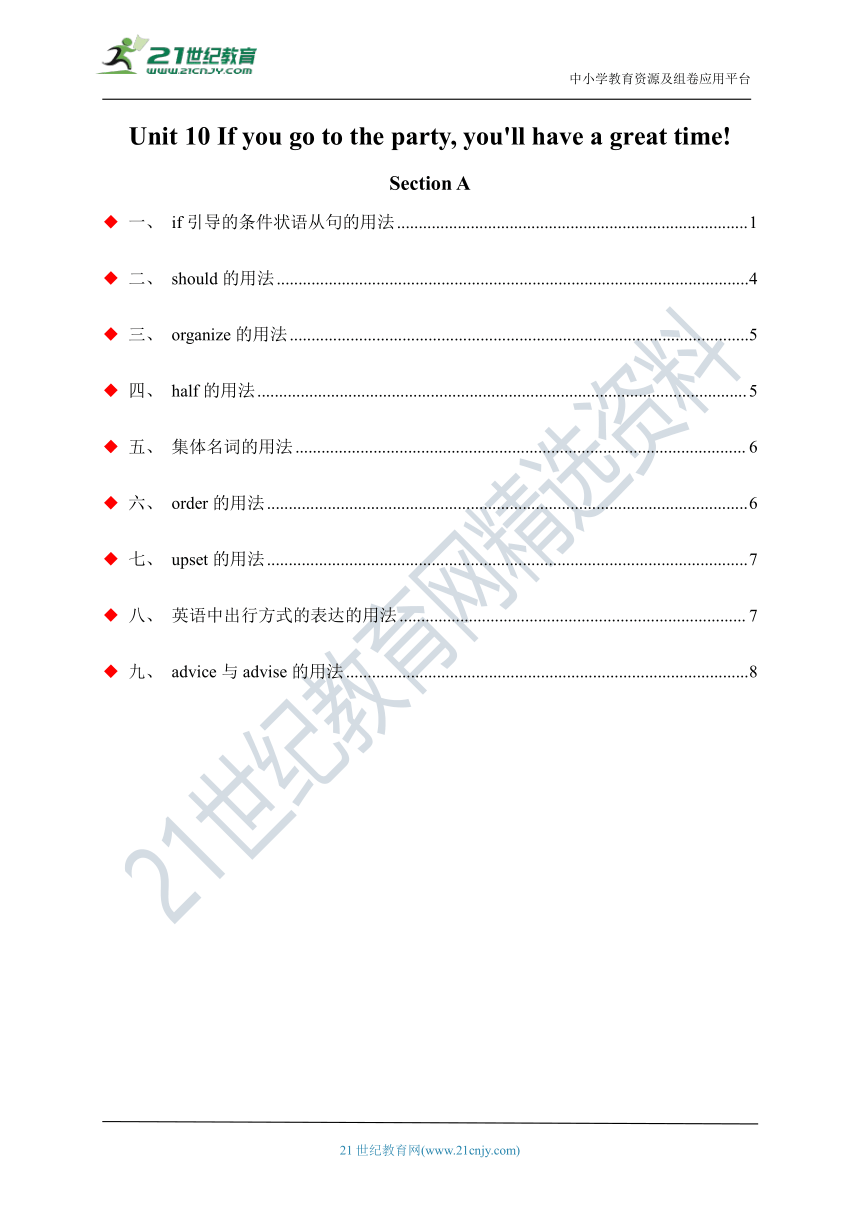 | |
| 格式 | docx | ||
| 文件大小 | 1010.8KB | ||
| 资源类型 | 试卷 | ||
| 版本资源 | 人教新目标(Go for it)版 | ||
| 科目 | 英语 | ||
| 更新时间 | 2021-09-29 16:28:08 | ||
图片预览

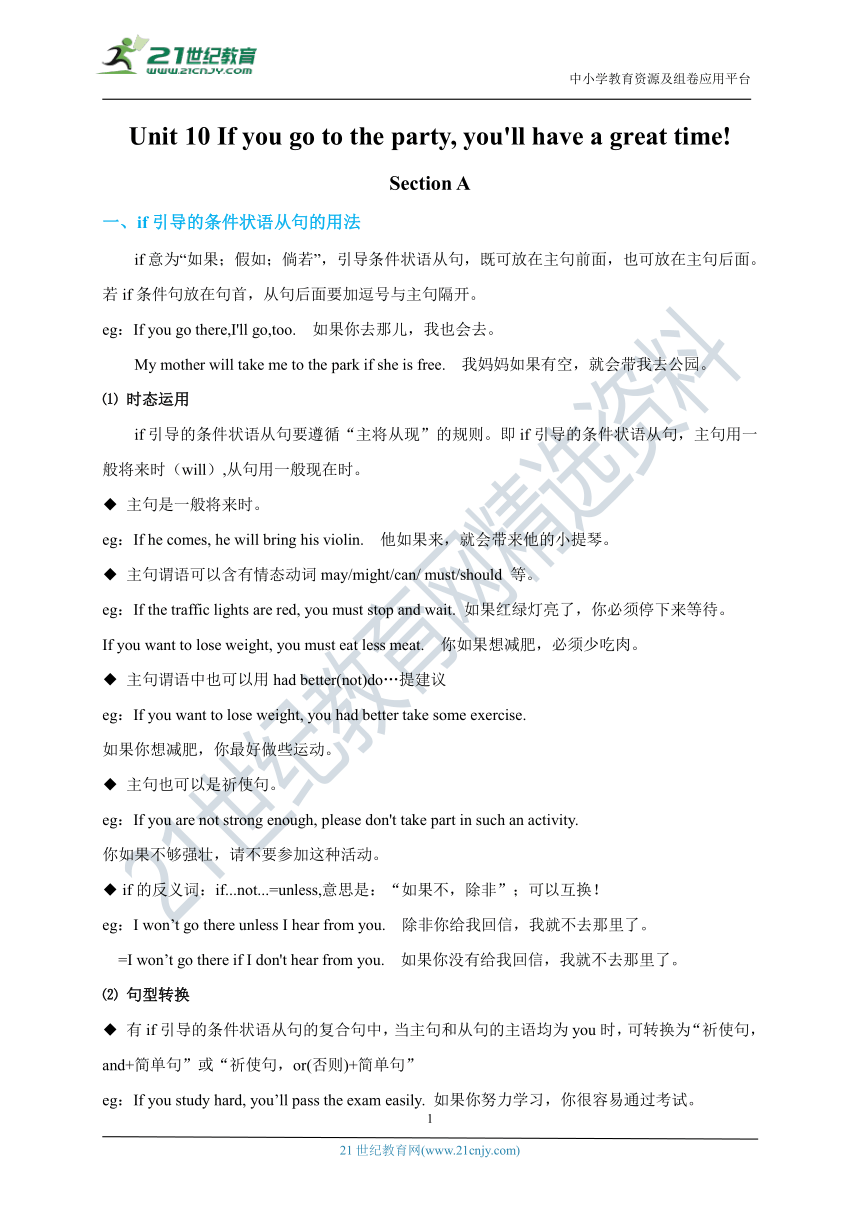
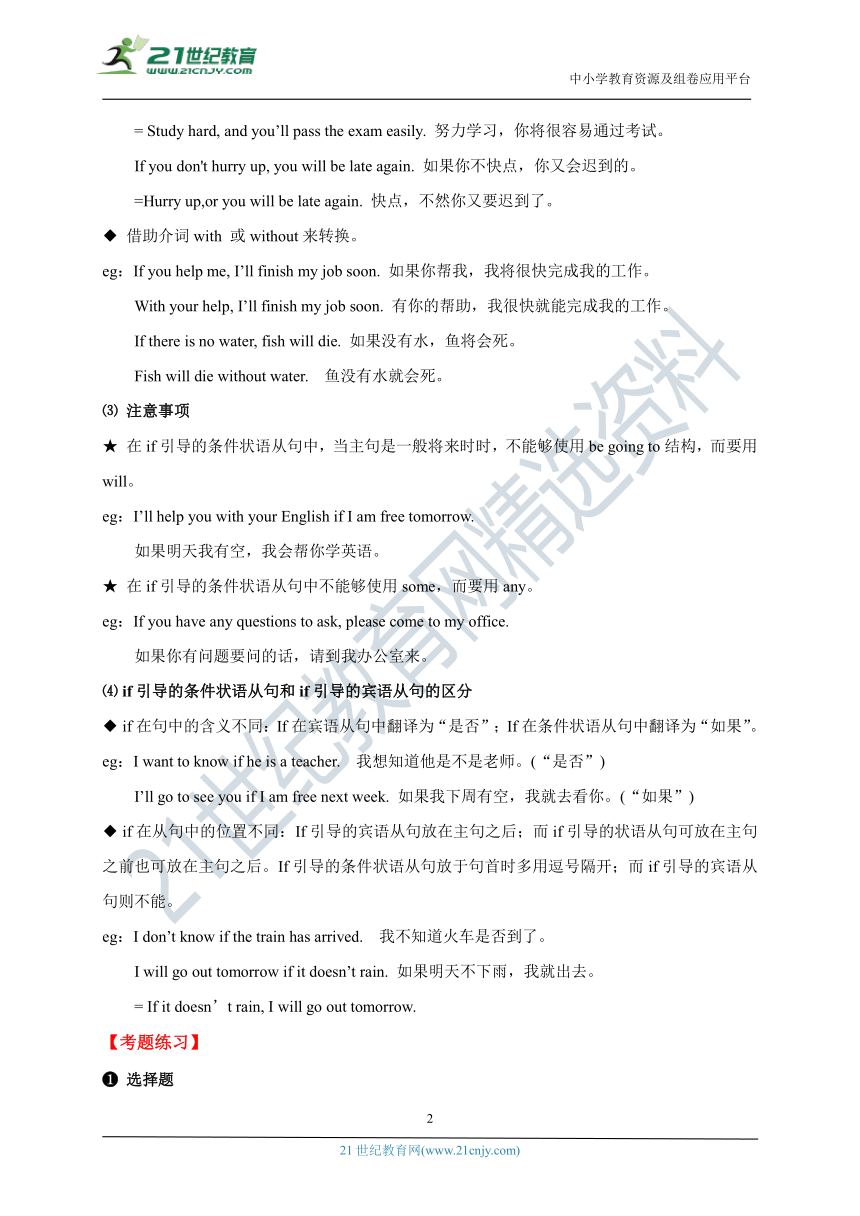
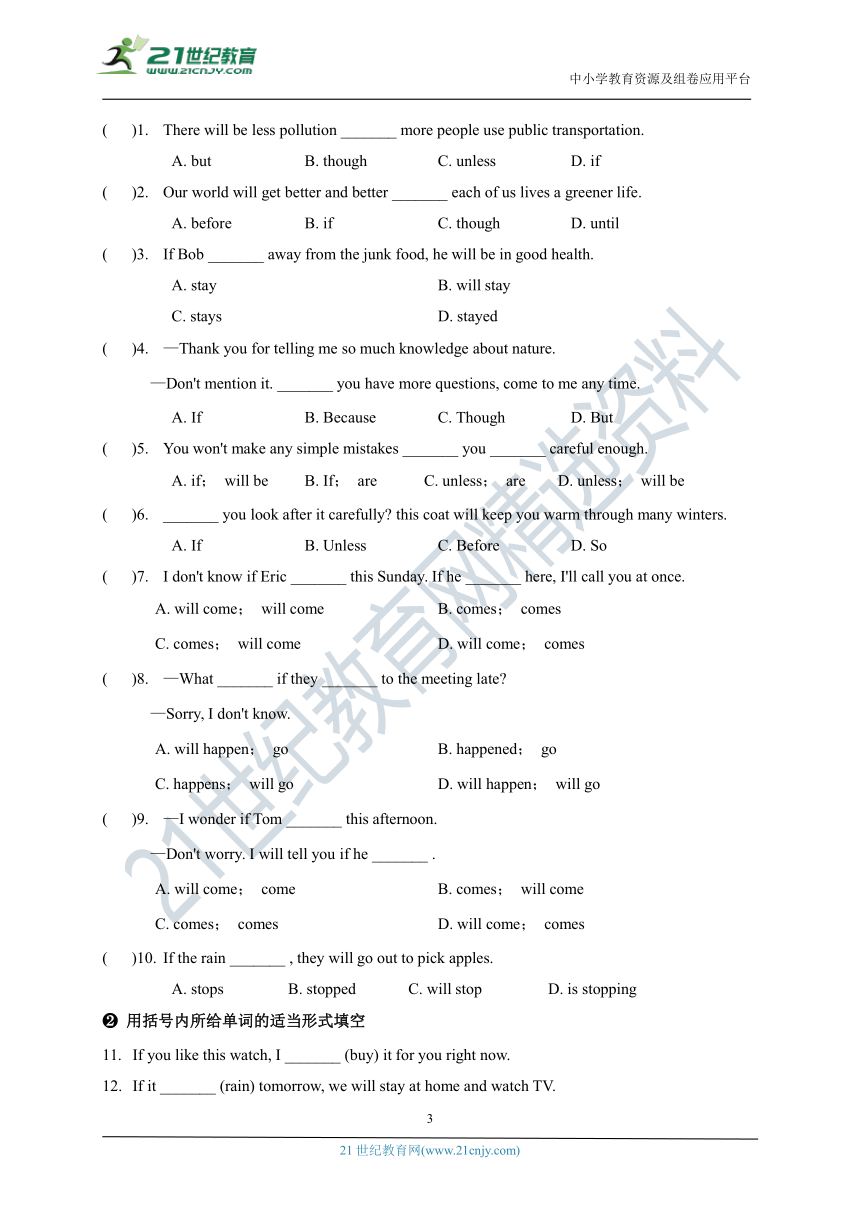
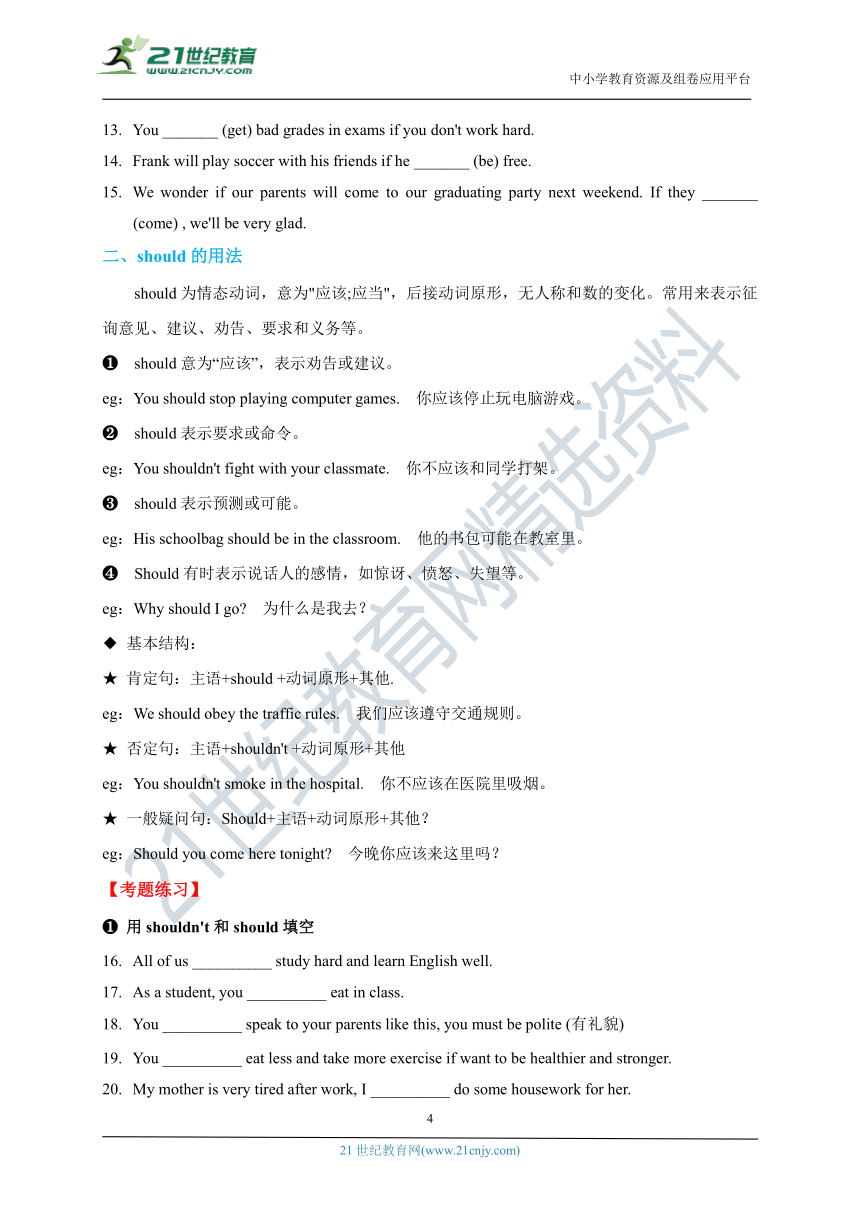
文档简介
Unit
10
If
you
go
to
the
party,
you'll
have
a
great
time!
Section
A
一、
if引导的条件状语从句的用法
1
二、
should的用法
4
三、
organize的用法
5
四、
half的用法
5
五、
集体名词的用法
6
六、
order的用法
6
七、
upset的用法
7
八、
英语中出行方式的表达的用法
7
九、
advice与advise的用法
8
中小学教育资源及组卷应用平台
21世纪教育网
www.21cnjy.com
精品试卷·第
2
页
(共
2
页)
21世纪教育网(www.21cnjy.com)
Unit
10
If
you
go
to
the
party,
you'll
have
a
great
time!
Section
A
if引导的条件状语从句的用法
if意为“如果;假如;倘若”,引导条件状语从句,既可放在主句前面,也可放在主句后面。若if条件句放在句首,从句后面要加逗号与主句隔开。
eg:If
you
go
there,I'll
go,too.
如果你去那儿,我也会去。
My
mother
will
take
me
to
the
park
if
she
is
free.
我妈妈如果有空,就会带我去公园。
⑴
时态运用
if引导的条件状语从句要遵循“主将从现”的规则。即if引导的条件状语从句,主句用一般将来时(will),从句用一般现在时。
◆
主句是一般将来时。
eg:If
he
comes,
he
will
bring
his
violin.
他如果来,就会带来他的小提琴。
◆
主句谓语可以含有情态动词may/might/can/
must/should
等。
eg:If
the
traffic
lights
are
red,
you
must
stop
and
wait.
如果红绿灯亮了,你必须停下来等待。
If
you
want
to
lose
weight,
you
must
eat
less
meat.
你如果想减肥,必须少吃肉。
◆
主句谓语中也可以用had
better(not)do…提建议
eg:If
you
want
to
lose
weight,
you
had
better
take
some
exercise.
如果你想减肥,你最好做些运动。
◆
主句也可以是祈使句。
eg:If
you
are
not
strong
enough,
please
don't
take
part
in
such
an
activity.
你如果不够强壮,请不要参加这种活动。
◆
if的反义词:if...not...=unless,意思是:“如果不,除非”;可以互换!
eg:I
won’t
go
there
unless
I
hear
from
you.
除非你给我回信,我就不去那里了。
=I
won’t
go
there
if
I
don't
hear
from
you.
如果你没有给我回信,我就不去那里了。
⑵
句型转换
◆
有if引导的条件状语从句的复合句中,当主句和从句的主语均为you时,可转换为“祈使句,and+简单句”或“祈使句,or(否则)+简单句”
eg:If
you
study
hard,
you’ll
pass
the
exam
easily.
如果你努力学习,你很容易通过考试。
=
Study
hard,
and
you’ll
pass
the
exam
easily.
努力学习,你将很容易通过考试。
If
you
don't
hurry
up,
you
will
be
late
again.
如果你不快点,你又会迟到的。
=Hurry
up,or
you
will
be
late
again.
快点,不然你又要迟到了。
◆
借助介词with
或without来转换。
eg:If
you
help
me,
I’ll
finish
my
job
soon.
如果你帮我,我将很快完成我的工作。
With
your
help,
I’ll
finish
my
job
soon.
有你的帮助,我很快就能完成我的工作。
If
there
is
no
water,
fish
will
die.
如果没有水,鱼将会死。
Fish
will
die
without
water.
鱼没有水就会死。
⑶
注意事项
★
在if引导的条件状语从句中,当主句是一般将来时时,不能够使用be
going
to结构,而要用will。
eg:I’ll
help
you
with
your
English
if
I
am
free
tomorrow.
如果明天我有空,我会帮你学英语。
★
在if引导的条件状语从句中不能够使用some,而要用any。
eg:If
you
have
any
questions
to
ask,
please
come
to
my
office.
如果你有问题要问的话,请到我办公室来。
⑷
if引导的条件状语从句和if引导的宾语从句的区分
◆
if在句中的含义不同:If在宾语从句中翻译为“是否”;If在条件状语从句中翻译为“如果”。
eg:I
want
to
know
if
he
is
a
teacher.
我想知道他是不是老师。(“是否”)
I’ll
go
to
see
you
if
I
am
free
next
week.
如果我下周有空,我就去看你。(“如果”)
◆
if在从句中的位置不同:If引导的宾语从句放在主句之后;而if引导的状语从句可放在主句之前也可放在主句之后。If引导的条件状语从句放于句首时多用逗号隔开;而if引导的宾语从句则不能。
eg:I
don’t
know
if
the
train
has
arrived.
我不知道火车是否到了。
I
will
go
out
tomorrow
if
it
doesn’t
rain.
如果明天不下雨,我就出去。
=
If
it
doesn’t
rain,
I
will
go
out
tomorrow.
【考题练习】
选择题
There
will
be
less
pollution
_______
more
people
use
public
transportation.
A.
but
B.
though
C.
unless
D.
if
Our
world
will
get
better
and
better
_______
each
of
us
lives
a
greener
life.
A.
before
B.
if
C.
though
D.
until
If
Bob
_______
away
from
the
junk
food,
he
will
be
in
good
health.
A.
stay
B.
will
stay
C.
stays
D.
stayed
—Thank
you
for
telling
me
so
much
knowledge
about
nature.
—Don't
mention
it.
_______
you
have
more
questions,
come
to
me
any
time.
A.
If
B.
Because
C.
Though
D.
But
You
won't
make
any
simple
mistakes
_______
you
_______
careful
enough.
A.
if;
will
be
B.
If;
are
C.
unless;
are
D.
unless;
will
be
_______
you
look
after
it
carefully
this
coat
will
keep
you
warm
through
many
winters.
A.
If
B.
Unless
C.
Before
D.
So
I
don't
know
if
Eric
_______
this
Sunday.
If
he
_______
here,
I'll
call
you
at
once.
A.
will
come;
will
come
B.
comes;
comes
C.
comes;
will
come
D.
will
come;
comes
—What
_______
if
they
_______
to
the
meeting
late
—Sorry,
I
don't
know.
A.
will
happen;
go
B.
happened;
go
C.
happens;
will
go
D.
will
happen;
will
go
—I
wonder
if
Tom
_______
this
afternoon.
—Don't
worry.
I
will
tell
you
if
he
_______
.
A.
will
come;
come
B.
comes;
will
come
C.
comes;
comes
D.
will
come;
comes
If
the
rain
_______
,
they
will
go
out
to
pick
apples.
A.
stops
B.
stopped
C.
will
stop
D.
is
stopping
用括号内所给单词的适当形式填空
If
you
like
this
watch,
I
_______
(buy)
it
for
you
right
now.
If
it
_______
(rain)
tomorrow,
we
will
stay
at
home
and
watch
TV.
You
_______
(get)
bad
grades
in
exams
if
you
don't
work
hard.
Frank
will
play
soccer
with
his
friends
if
he
_______
(be)
free.
We
wonder
if
our
parents
will
come
to
our
graduating
party
next
weekend.
If
they
_______
(come)
,
we'll
be
very
glad.
should的用法
should为情态动词,意为"应该;应当",后接动词原形,无人称和数的变化。常用来表示征询意见、建议、劝告、要求和义务等。
should意为“应该”,表示劝告或建议。
eg:You
should
stop
playing
computer
games.
你应该停止玩电脑游戏。
should表示要求或命令。
eg:You
shouldn't
fight
with
your
classmate.
你不应该和同学打架。
should表示预测或可能。
eg:His
schoolbag
should
be
in
the
classroom.
他的书包可能在教室里。
Should有时表示说话人的感情,如惊讶、愤怒、失望等。
eg:Why
should
I
go
为什么是我去?
◆
基本结构:
★
肯定句:主语+should
+动词原形+其他.
eg:We
should
obey
the
traffic
rules.
我们应该遵守交通规则。
★
否定句:主语+shouldn't
+动词原形+其他
eg:You
shouldn't
smoke
in
the
hospital.
你不应该在医院里吸烟。
★
一般疑问句:Should+主语+动词原形+其他?
eg:Should
you
come
here
tonight
今晚你应该来这里吗?
【考题练习】
用shouldn't和should填空
All
of
us
__________
study
hard
and
learn
English
well.
As
a
student,
you
__________
eat
in
class.
You
__________
speak
to
your
parents
like
this,
you
must
be
polite
(有礼貌)
You
__________
eat
less
and
take
more
exercise
if
want
to
be
healthier
and
stronger.
My
mother
is
very
tired
after
work,
I
__________
do
some
housework
for
her.
选择题
It's
nearly
seven
o'clock.
Jack
_______
be
here
at
any
moment.
A.
must
B.
need
C.
should
D.
can
—When
can
I
come
for
the
photos
I
need
them
tomorrow
afternoon.
—They
_______
be
ready
by
12:00.
A.
can
B.
should
C.
might
D.
need
Mary
_______
be
in
Paris,
for
I
saw
her
in
the
town
a
few
minutes
ago.
A.
mustn't
B.
can't
C.
shouldn't
D.
may
not
Johnny,
you
_______
play
with
the
knife,
you
_______
hurt
yourself.
A.
won't;
can't
B.
mustn't;
may
C.
shouldn't;
must
D.
can't;
shouldn't
—Are
you
coming
to
Jeff's
party
—I'm
not
sure.
I
_______
go
to
the
concert
instead.
must
B.
would
C.
should
D.
might
organize的用法
organize(
=
organise)用作及物动词,意为“组织;安排”,后面的宾语一般为组织、活动、程序等。organize后面也可跟表示物品的名词,意为“筹备;准备”。名词为organization,意为“组织”;organized形容词,意为“有组织的”;organizer名词,意为“组织者”
【考题练习】
凯特将组织什么?
What
will
Kate
__________
上个月我们组织了一次聚会。
Last
month,
we
__________
a
party.
你能帮忙整理食物吗?
Can
you
help
to
__________
food
half的用法
half作限定词,意为“一半的,半数”。half
(of)后接名词时,名词前应有the,this,my等词修饰,这时of可省略。“half
(of)
+名词”作主语时,如果名词是可数名词复数形式,谓语动词用复数形式;如果名词是不可数名词或单数名词,谓语动词用单数形式。
◆
half
of后也可接代词,这时of不能省略。
◆
half还可用作名词,意为“一半;半”。其复数形式为halves。
eg:one
hour
and
a
half
=
one
and
a
half
hours
一个半小时
【考题练习】
这些书有一半是故事书。
__________
the
books
__________
storybooks.
昨天晚上她一半的钱被偷走了。
__________
her
money
__________
stolen
last
night.
如果我们今天举行,班里一半的学生将不会来。
If
we
have
it
today,
__________
__________
__________
won't
come.
他们中有一半的人在昨晚的聚会上玩得很开心。
__________
__________
__________
enjoyed
the
party
last
night.
四个半小时
____________________________________________________________
集体名词的用法
集体名词表示由若干个体组成的集合体,它可以表达单数意义,也可以表达复数意义,常见的集体名词:class
family
people
police
team;具体情况如下:
◆
当集体名词强调组成该集体的各个成员时,表示复数意义(但无词形变化,即用其本身表达复数)。
◆
当集体名词表示一个单位(即表达一个不可分割的整体)时,它表示单数意义,作主语时,
谓语动词用第三人称单数形式。
【考题练习】
班里所有的学生都对英语很感兴趣。
All
the
class
__________
very
interested
in
English.
我们班在五楼。
Our
class
__________
on
the
fifth
floor.
order的用法
order作及物动词,意为“订购;订货;点菜”。此处为order
sth.
from......结构,意为“从……订购某物”。
◆
order作动词,还可意为“命令;要求”。order
sb.
to
do
sth.意为''命令某人做某事”。
◆
order作不可数名词,意为“次序;顺序;点菜"。
◆
order可构成in
order
to或in
order
that......结构,意为“为了……”。
【考题练习】
不,咱们从饭店订餐吧。
No,
let's
__________
food
__________
a
restaurant.
我从那家商店订购了些衣服。
I
__________
some
clothes
__________
that
shop.
军官命令他们立即行动。
The
officer
__________
them
to
act
at
once.
姓名是按字母顺序排列的。
The
names
are
listed
in
alphabetical(字母顺序)
__________.
可以点菜了吗?
May
I
take/have
your
__________
She
gets
up
early
in
order
to
catch
the
early
bus.(改为同义句)
She
gets
up
early
__________
__________
__________
she
can
catch
the
early
bus.
upset的用法
upset形容词,意为“难过;失望;沮丧”,通常不用在名词前作定语。be
upset
with
sb.意为“生某人的气;对某人感到不快”。
【考题练习】
她朋友那样对她,她真的很难过。
She
was
really
__________
about
the
way
her
friend
treated
her.
如果我去参加聚会,他们将会很失望。
If
I
go
to
the
party,
they
will
be
__________.
她还在生他的气。
She
__________
still
__________
__________
him.
英语中出行方式的表达的用法
take+
a/the+交通工具名称
by+交通工具名称
动词+
to
+地点名词,常用的动词有walk,ride,drive,fly等。
in/on+限定词+交通工具名称
【考题练习】
我经常乘公共汽车去上学。
I
often
_______
_______
_______
to
school.
如果我乘出租车去,那将会太昂贵。
If
I
_______
_______
_______,
it
will
be
too
expensive.
我乘公共汽车去上学。
I
go
to
school
_______
_______.
他想开车去超市。
He
wants
to
_______
_______
the
supermarket.
她骑自行车去上学。
She
goes
to
school
_______
_______
_______.
advice与advise的用法
advice意为“建议”;“劝告”;“忠告”等,是不可数名词,表示数量时常借助于piece或some(—些)等词;give
sb.
some
advice
“给某人些建议”;give
sb.
some
advice
on......意为“在某方面给某人一些建议”。get
advice
from
意为“从…得到建议”。
eg:a
piece
of
advice
一条建议
two
pieces
of
advice
两条建议
You
can
get
advice
from
your
parents.
你(们)可以从你(们)父母那儿得到建议。
◆
advise意为“建议”,通常为及物动词,若其后的宾语是动词,通常应是动名词,而不能是不定式,advise
sb.
about/on...
意为“关于……给某人忠告/建议”。advise
doing
sth.
意为“劝告/建议做某事”。
eg:I
advise
waiting
till
the
right
time.
(√)
我建议等到适当的时候。
I
advise
to
wait
till
the
right
time.
(×)
注意:advise之后不能直接跟不定式,但可接不定式的复合结构,advise
sb.
(not)
to
do
sth.
意为“劝告某人(不要)做某事”。
◆
advise后接不定式复合结构时的被动语态形式不要与上面第一个句型混为一谈。
eg:主动式:He
advised
us
to
sell
the
house.
被动式:We
were
advised
to
sell
the
house.
比较错误句型:We
advised
to
sell
the
house.(误)
【考题练习】
请你给我一些建议好吗?
Can
you
give
me
_______
_______
please
他在怎样学好英语方面给了我一些建议。
He
gave
me
_______
_______
_______
how
to
learn
English
well.
就学习问题老师们给我们提出了建议。
The
teachers
_______
us
_______
study.
我建议你尽早购票。
I
_______
_______
your
tickets
as
early
as
possible.
医生建议孩子们不要吃太多垃圾食品。
The
doctor
_______
children
_______
_______
_______
too
much
junk
food.
参
考
答
案
D
B
C
A
B
A
D
A
D
A
will
buy
rains
will
get
is
come
should
shouldn't
shouldn't
should
should
C
B
B
B
D
organize
organized
organize
Half;are
Half;was
half
the
class
Half
of
them
Four
and
a
half
hours/Four
hours
and
a
half
are
is
order;from
ordered;from
orders/ordered
order
order
in
order
that
upset
upset
is;upset
with
take
a
bus
take
a
taxi
by
bus
drive
to
on
her
bike
some
advice
some
advice
on
advise;about
advised
buying
advises;not
to
eat
21世纪教育网(www.21cnjy.com)
10
If
you
go
to
the
party,
you'll
have
a
great
time!
Section
A
一、
if引导的条件状语从句的用法
1
二、
should的用法
4
三、
organize的用法
5
四、
half的用法
5
五、
集体名词的用法
6
六、
order的用法
6
七、
upset的用法
7
八、
英语中出行方式的表达的用法
7
九、
advice与advise的用法
8
中小学教育资源及组卷应用平台
21世纪教育网
www.21cnjy.com
精品试卷·第
2
页
(共
2
页)
21世纪教育网(www.21cnjy.com)
Unit
10
If
you
go
to
the
party,
you'll
have
a
great
time!
Section
A
if引导的条件状语从句的用法
if意为“如果;假如;倘若”,引导条件状语从句,既可放在主句前面,也可放在主句后面。若if条件句放在句首,从句后面要加逗号与主句隔开。
eg:If
you
go
there,I'll
go,too.
如果你去那儿,我也会去。
My
mother
will
take
me
to
the
park
if
she
is
free.
我妈妈如果有空,就会带我去公园。
⑴
时态运用
if引导的条件状语从句要遵循“主将从现”的规则。即if引导的条件状语从句,主句用一般将来时(will),从句用一般现在时。
◆
主句是一般将来时。
eg:If
he
comes,
he
will
bring
his
violin.
他如果来,就会带来他的小提琴。
◆
主句谓语可以含有情态动词may/might/can/
must/should
等。
eg:If
the
traffic
lights
are
red,
you
must
stop
and
wait.
如果红绿灯亮了,你必须停下来等待。
If
you
want
to
lose
weight,
you
must
eat
less
meat.
你如果想减肥,必须少吃肉。
◆
主句谓语中也可以用had
better(not)do…提建议
eg:If
you
want
to
lose
weight,
you
had
better
take
some
exercise.
如果你想减肥,你最好做些运动。
◆
主句也可以是祈使句。
eg:If
you
are
not
strong
enough,
please
don't
take
part
in
such
an
activity.
你如果不够强壮,请不要参加这种活动。
◆
if的反义词:if...not...=unless,意思是:“如果不,除非”;可以互换!
eg:I
won’t
go
there
unless
I
hear
from
you.
除非你给我回信,我就不去那里了。
=I
won’t
go
there
if
I
don't
hear
from
you.
如果你没有给我回信,我就不去那里了。
⑵
句型转换
◆
有if引导的条件状语从句的复合句中,当主句和从句的主语均为you时,可转换为“祈使句,and+简单句”或“祈使句,or(否则)+简单句”
eg:If
you
study
hard,
you’ll
pass
the
exam
easily.
如果你努力学习,你很容易通过考试。
=
Study
hard,
and
you’ll
pass
the
exam
easily.
努力学习,你将很容易通过考试。
If
you
don't
hurry
up,
you
will
be
late
again.
如果你不快点,你又会迟到的。
=Hurry
up,or
you
will
be
late
again.
快点,不然你又要迟到了。
◆
借助介词with
或without来转换。
eg:If
you
help
me,
I’ll
finish
my
job
soon.
如果你帮我,我将很快完成我的工作。
With
your
help,
I’ll
finish
my
job
soon.
有你的帮助,我很快就能完成我的工作。
If
there
is
no
water,
fish
will
die.
如果没有水,鱼将会死。
Fish
will
die
without
water.
鱼没有水就会死。
⑶
注意事项
★
在if引导的条件状语从句中,当主句是一般将来时时,不能够使用be
going
to结构,而要用will。
eg:I’ll
help
you
with
your
English
if
I
am
free
tomorrow.
如果明天我有空,我会帮你学英语。
★
在if引导的条件状语从句中不能够使用some,而要用any。
eg:If
you
have
any
questions
to
ask,
please
come
to
my
office.
如果你有问题要问的话,请到我办公室来。
⑷
if引导的条件状语从句和if引导的宾语从句的区分
◆
if在句中的含义不同:If在宾语从句中翻译为“是否”;If在条件状语从句中翻译为“如果”。
eg:I
want
to
know
if
he
is
a
teacher.
我想知道他是不是老师。(“是否”)
I’ll
go
to
see
you
if
I
am
free
next
week.
如果我下周有空,我就去看你。(“如果”)
◆
if在从句中的位置不同:If引导的宾语从句放在主句之后;而if引导的状语从句可放在主句之前也可放在主句之后。If引导的条件状语从句放于句首时多用逗号隔开;而if引导的宾语从句则不能。
eg:I
don’t
know
if
the
train
has
arrived.
我不知道火车是否到了。
I
will
go
out
tomorrow
if
it
doesn’t
rain.
如果明天不下雨,我就出去。
=
If
it
doesn’t
rain,
I
will
go
out
tomorrow.
【考题练习】
选择题
There
will
be
less
pollution
_______
more
people
use
public
transportation.
A.
but
B.
though
C.
unless
D.
if
Our
world
will
get
better
and
better
_______
each
of
us
lives
a
greener
life.
A.
before
B.
if
C.
though
D.
until
If
Bob
_______
away
from
the
junk
food,
he
will
be
in
good
health.
A.
stay
B.
will
stay
C.
stays
D.
stayed
—Thank
you
for
telling
me
so
much
knowledge
about
nature.
—Don't
mention
it.
_______
you
have
more
questions,
come
to
me
any
time.
A.
If
B.
Because
C.
Though
D.
But
You
won't
make
any
simple
mistakes
_______
you
_______
careful
enough.
A.
if;
will
be
B.
If;
are
C.
unless;
are
D.
unless;
will
be
_______
you
look
after
it
carefully
this
coat
will
keep
you
warm
through
many
winters.
A.
If
B.
Unless
C.
Before
D.
So
I
don't
know
if
Eric
_______
this
Sunday.
If
he
_______
here,
I'll
call
you
at
once.
A.
will
come;
will
come
B.
comes;
comes
C.
comes;
will
come
D.
will
come;
comes
—What
_______
if
they
_______
to
the
meeting
late
—Sorry,
I
don't
know.
A.
will
happen;
go
B.
happened;
go
C.
happens;
will
go
D.
will
happen;
will
go
—I
wonder
if
Tom
_______
this
afternoon.
—Don't
worry.
I
will
tell
you
if
he
_______
.
A.
will
come;
come
B.
comes;
will
come
C.
comes;
comes
D.
will
come;
comes
If
the
rain
_______
,
they
will
go
out
to
pick
apples.
A.
stops
B.
stopped
C.
will
stop
D.
is
stopping
用括号内所给单词的适当形式填空
If
you
like
this
watch,
I
_______
(buy)
it
for
you
right
now.
If
it
_______
(rain)
tomorrow,
we
will
stay
at
home
and
watch
TV.
You
_______
(get)
bad
grades
in
exams
if
you
don't
work
hard.
Frank
will
play
soccer
with
his
friends
if
he
_______
(be)
free.
We
wonder
if
our
parents
will
come
to
our
graduating
party
next
weekend.
If
they
_______
(come)
,
we'll
be
very
glad.
should的用法
should为情态动词,意为"应该;应当",后接动词原形,无人称和数的变化。常用来表示征询意见、建议、劝告、要求和义务等。
should意为“应该”,表示劝告或建议。
eg:You
should
stop
playing
computer
games.
你应该停止玩电脑游戏。
should表示要求或命令。
eg:You
shouldn't
fight
with
your
classmate.
你不应该和同学打架。
should表示预测或可能。
eg:His
schoolbag
should
be
in
the
classroom.
他的书包可能在教室里。
Should有时表示说话人的感情,如惊讶、愤怒、失望等。
eg:Why
should
I
go
为什么是我去?
◆
基本结构:
★
肯定句:主语+should
+动词原形+其他.
eg:We
should
obey
the
traffic
rules.
我们应该遵守交通规则。
★
否定句:主语+shouldn't
+动词原形+其他
eg:You
shouldn't
smoke
in
the
hospital.
你不应该在医院里吸烟。
★
一般疑问句:Should+主语+动词原形+其他?
eg:Should
you
come
here
tonight
今晚你应该来这里吗?
【考题练习】
用shouldn't和should填空
All
of
us
__________
study
hard
and
learn
English
well.
As
a
student,
you
__________
eat
in
class.
You
__________
speak
to
your
parents
like
this,
you
must
be
polite
(有礼貌)
You
__________
eat
less
and
take
more
exercise
if
want
to
be
healthier
and
stronger.
My
mother
is
very
tired
after
work,
I
__________
do
some
housework
for
her.
选择题
It's
nearly
seven
o'clock.
Jack
_______
be
here
at
any
moment.
A.
must
B.
need
C.
should
D.
can
—When
can
I
come
for
the
photos
I
need
them
tomorrow
afternoon.
—They
_______
be
ready
by
12:00.
A.
can
B.
should
C.
might
D.
need
Mary
_______
be
in
Paris,
for
I
saw
her
in
the
town
a
few
minutes
ago.
A.
mustn't
B.
can't
C.
shouldn't
D.
may
not
Johnny,
you
_______
play
with
the
knife,
you
_______
hurt
yourself.
A.
won't;
can't
B.
mustn't;
may
C.
shouldn't;
must
D.
can't;
shouldn't
—Are
you
coming
to
Jeff's
party
—I'm
not
sure.
I
_______
go
to
the
concert
instead.
must
B.
would
C.
should
D.
might
organize的用法
organize(
=
organise)用作及物动词,意为“组织;安排”,后面的宾语一般为组织、活动、程序等。organize后面也可跟表示物品的名词,意为“筹备;准备”。名词为organization,意为“组织”;organized形容词,意为“有组织的”;organizer名词,意为“组织者”
【考题练习】
凯特将组织什么?
What
will
Kate
__________
上个月我们组织了一次聚会。
Last
month,
we
__________
a
party.
你能帮忙整理食物吗?
Can
you
help
to
__________
food
half的用法
half作限定词,意为“一半的,半数”。half
(of)后接名词时,名词前应有the,this,my等词修饰,这时of可省略。“half
(of)
+名词”作主语时,如果名词是可数名词复数形式,谓语动词用复数形式;如果名词是不可数名词或单数名词,谓语动词用单数形式。
◆
half
of后也可接代词,这时of不能省略。
◆
half还可用作名词,意为“一半;半”。其复数形式为halves。
eg:one
hour
and
a
half
=
one
and
a
half
hours
一个半小时
【考题练习】
这些书有一半是故事书。
__________
the
books
__________
storybooks.
昨天晚上她一半的钱被偷走了。
__________
her
money
__________
stolen
last
night.
如果我们今天举行,班里一半的学生将不会来。
If
we
have
it
today,
__________
__________
__________
won't
come.
他们中有一半的人在昨晚的聚会上玩得很开心。
__________
__________
__________
enjoyed
the
party
last
night.
四个半小时
____________________________________________________________
集体名词的用法
集体名词表示由若干个体组成的集合体,它可以表达单数意义,也可以表达复数意义,常见的集体名词:class
family
people
police
team;具体情况如下:
◆
当集体名词强调组成该集体的各个成员时,表示复数意义(但无词形变化,即用其本身表达复数)。
◆
当集体名词表示一个单位(即表达一个不可分割的整体)时,它表示单数意义,作主语时,
谓语动词用第三人称单数形式。
【考题练习】
班里所有的学生都对英语很感兴趣。
All
the
class
__________
very
interested
in
English.
我们班在五楼。
Our
class
__________
on
the
fifth
floor.
order的用法
order作及物动词,意为“订购;订货;点菜”。此处为order
sth.
from......结构,意为“从……订购某物”。
◆
order作动词,还可意为“命令;要求”。order
sb.
to
do
sth.意为''命令某人做某事”。
◆
order作不可数名词,意为“次序;顺序;点菜"。
◆
order可构成in
order
to或in
order
that......结构,意为“为了……”。
【考题练习】
不,咱们从饭店订餐吧。
No,
let's
__________
food
__________
a
restaurant.
我从那家商店订购了些衣服。
I
__________
some
clothes
__________
that
shop.
军官命令他们立即行动。
The
officer
__________
them
to
act
at
once.
姓名是按字母顺序排列的。
The
names
are
listed
in
alphabetical(字母顺序)
__________.
可以点菜了吗?
May
I
take/have
your
__________
She
gets
up
early
in
order
to
catch
the
early
bus.(改为同义句)
She
gets
up
early
__________
__________
__________
she
can
catch
the
early
bus.
upset的用法
upset形容词,意为“难过;失望;沮丧”,通常不用在名词前作定语。be
upset
with
sb.意为“生某人的气;对某人感到不快”。
【考题练习】
她朋友那样对她,她真的很难过。
She
was
really
__________
about
the
way
her
friend
treated
her.
如果我去参加聚会,他们将会很失望。
If
I
go
to
the
party,
they
will
be
__________.
她还在生他的气。
She
__________
still
__________
__________
him.
英语中出行方式的表达的用法
take+
a/the+交通工具名称
by+交通工具名称
动词+
to
+地点名词,常用的动词有walk,ride,drive,fly等。
in/on+限定词+交通工具名称
【考题练习】
我经常乘公共汽车去上学。
I
often
_______
_______
_______
to
school.
如果我乘出租车去,那将会太昂贵。
If
I
_______
_______
_______,
it
will
be
too
expensive.
我乘公共汽车去上学。
I
go
to
school
_______
_______.
他想开车去超市。
He
wants
to
_______
_______
the
supermarket.
她骑自行车去上学。
She
goes
to
school
_______
_______
_______.
advice与advise的用法
advice意为“建议”;“劝告”;“忠告”等,是不可数名词,表示数量时常借助于piece或some(—些)等词;give
sb.
some
advice
“给某人些建议”;give
sb.
some
advice
on......意为“在某方面给某人一些建议”。get
advice
from
意为“从…得到建议”。
eg:a
piece
of
advice
一条建议
two
pieces
of
advice
两条建议
You
can
get
advice
from
your
parents.
你(们)可以从你(们)父母那儿得到建议。
◆
advise意为“建议”,通常为及物动词,若其后的宾语是动词,通常应是动名词,而不能是不定式,advise
sb.
about/on...
意为“关于……给某人忠告/建议”。advise
doing
sth.
意为“劝告/建议做某事”。
eg:I
advise
waiting
till
the
right
time.
(√)
我建议等到适当的时候。
I
advise
to
wait
till
the
right
time.
(×)
注意:advise之后不能直接跟不定式,但可接不定式的复合结构,advise
sb.
(not)
to
do
sth.
意为“劝告某人(不要)做某事”。
◆
advise后接不定式复合结构时的被动语态形式不要与上面第一个句型混为一谈。
eg:主动式:He
advised
us
to
sell
the
house.
被动式:We
were
advised
to
sell
the
house.
比较错误句型:We
advised
to
sell
the
house.(误)
【考题练习】
请你给我一些建议好吗?
Can
you
give
me
_______
_______
please
他在怎样学好英语方面给了我一些建议。
He
gave
me
_______
_______
_______
how
to
learn
English
well.
就学习问题老师们给我们提出了建议。
The
teachers
_______
us
_______
study.
我建议你尽早购票。
I
_______
_______
your
tickets
as
early
as
possible.
医生建议孩子们不要吃太多垃圾食品。
The
doctor
_______
children
_______
_______
_______
too
much
junk
food.
参
考
答
案
D
B
C
A
B
A
D
A
D
A
will
buy
rains
will
get
is
come
should
shouldn't
shouldn't
should
should
C
B
B
B
D
organize
organized
organize
Half;are
Half;was
half
the
class
Half
of
them
Four
and
a
half
hours/Four
hours
and
a
half
are
is
order;from
ordered;from
orders/ordered
order
order
in
order
that
upset
upset
is;upset
with
take
a
bus
take
a
taxi
by
bus
drive
to
on
her
bike
some
advice
some
advice
on
advise;about
advised
buying
advises;not
to
eat
21世纪教育网(www.21cnjy.com)
同课章节目录
- Unit 1 Where did you go on vacation?
- Section A
- Section B
- Unit 2 How often do you exercise?
- Section A
- Section B
- Unit 3 I'm more outgoing than my sister.
- Section A
- Section B
- Unit 4 What's the best movie theater?
- Section A
- Section B
- Unit 5 Do you want to watch a game show?
- Section A
- Section B
- Unit 6 I'm going to study computer science.
- Section A
- Section B
- Unit 7 Will people have robots?
- Section A
- Section B
- Unit 8 How do you make a banana milk shake?
- Section A
- Section B
- Unit 9 Can you come to my party?
- Section A
- Section B
- Unit 10 If you go to the party, you'll have a grea
- Section A
- Section B
